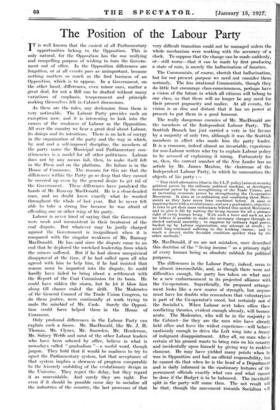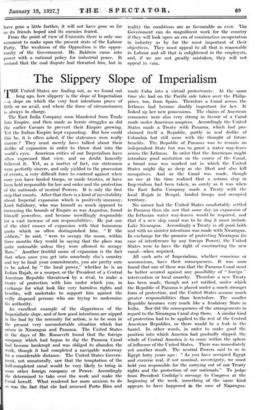The Position of the Labour Party
IT is well known that the easiest of all Parliamentary opportunities belong to the Opposition. This is only natural, for the Opposition has the one unifying and compelling purpose of wishing to turn the Govern- ment out of office. In the Opposition differences are forgotten, or at all events pass as unimportant, because nothing matters so much as the first business of an Opposition, which is to oppose. In a Government, on. the other hand, differences, even minor ones, matter a great deal, for not a Bill can be drafted without many variations of emphasis, temperament and principle making themselves felt in Cabinet discussions.
As these arc the rules, any declension from them is very noticeable. The Labour Party provides such an exception now, and it is interesting to look into the causes of the weakness of Labour as the Opposition. All over the country we hear a great deal about Labour, its doings and its intentions. There is no lack of energy in the organization of the party and the way in which, by zeal and a self-imposed discipline, the members of the party nurse the Municipal and Parliamentary con- stituencies is a model for all other politicians. Labour does not by any means fail, then, to make itself felt in the Press and on the platform. Its failure is in the House of Commons. The reasons for this arc that the differences within the Party go so deep that they cannot he covered up even by the general desire to get rid of the Government. These differences have paralysed the hands of Mr. Ramsay MacDonald. He is a clear-headed man, and no doubt knew exactly what he wanted throughout the whole of last year. But he never felt able to take a strong line because he was afraid of offending one or other wing of his party.
Labour is never tired of saying that the Government were weak and inconsistent in their treatment of the coal dispute. But whatever may be justly charged against the Government is insignificant when it is compared with the singular weakness of Mr. Ramsay MacDonald. He has said since the dispute came to an end that he deplored the wretched leadership from which the miners suffered. But if he had shown unequivocal disapproval at the time, if he had called upon all who agreed with him to help him, if he had . insisted that reason must be imparted into the dispute, he could hardly have failed to bring about a settlement with the Report of the Coal Commission for its basis. He could have ridden the storm, but he let it blow him along till chance ended the drift. The Moderates of the General Council of the Trade Union Congress, to do them justice, were continually at work trying to undo the mischief of Mr. Cook. Surely the Opposi- tion could have helped them in the House of Commons.
Only profound differences in the Labour Party can explain such a fiasco. Mr. MacDonald, like Mr. J. H. Thomas, Mr. Clones, Mr. Snowden, Mr. Henderson, Mr. Sidney Webb and most of the other Labour leaderS who have been sobered by office, believe in what is nowadays called " gradualism "—a useful word, though jargon. They hold that it would be madness to try to upset the Parliamentary system, but that acceptance of that system implies a slowness of progress comparable to the leisurely unfolding of the evolutionary design in the Universe. They regret the delay, but they regard it as unavoidable. And surely they are right. For even if it should be possible some day to socialize all the industries of the country; the last processes of that very difficult transition could not be managed unless the whole mechanism were working with the accuracy of a clock. To suppose that the change can be made suddenly, or—still worse—that it can be made by first producing a state of ruin, is merely the hallucination of fanatics.
The Communists, of course, cherish that hallucination, but for our present purpose we need.not consider them seriously. The less irrational Communists, though they do little but encourage class-consciousness, perhaps have a vision of the future in which all citizens will belong to one class, so that there will no longer be any need for their present pugnacity and malice. At all events, the vision is so dim and distant that it has no power at present to put them in a good humour.
The really dangerous enemies of Mr. MacDonald are the members of the Independent Labour Party. The Scottish Branch has just carried a vote in his favour by a majority of only two, although it was the Scottish members in effect who made him the party leader. It is a common, indeed almost an invariable, experience for non-Labour writers who try to explain Labour policy to be accused of explaining it wrong. Fortunately for us, then, the current number of the New Leader has an article by Mr. James Maxton, the chairman of the Independent Labour Party, in which he summarizes the objects of his party :- " That third alternative [that is, the I.L.P. policy] aims at securing political power by the ordinary political machine, at developing industrial power by the strengthening of the Trade Unions, and at increasing economic power by strengthening the Co-operative Movement. It aims at co-ordinating and combining these Move- ments as they have never been combined before. It aims at inspiring them with a revolutionary, and not a gradualistic, objective. It tries to get their mass enthusiasm behind this united Movement, and to give it life by making the living income for all a primary right of every human being. With such a force and such an aim we believe it possible to make the necessary changes through an elected national assembly ; to suppress by ordinary legal power, backed up by Labour organization, any attempt at revolt ; to avoid long-continued suffering to the working classes ; and to
reach a decent stable Socialist condition quicker than by the other methods."
Mr. MacDonald, if we are not mistaken, once described this doctrine of the " living income " as a primary right of every human being as absolute rubbish for political purposes.
The differences in the Labour Party, indeed, seem to be almost irreconcilable, and, as though there were not difficulties enough, the party has taken on what may be a new embarrassment in its projected alliance with the Co-operators. Superficially, the proposed arrange- ment looks like a new source of strength, but anyone must have his doubts who remembers that voluntaryism is part of the Co-operator's creed, but certainly not of the Socialist's. When Labour next takes office these conflicting theories, evident enough already, will become acute. The Moderates, who will be in the majority in the Cabinet—for they are the men who have already held office and have the widest experience—will behave cautiously enough to drive the Left wing into a frenzy of indignant disappointment. After all, no man who is certain of his ground wants to bring ruin on his country and incidentally upon himself by giving way to reckless clamour. He may have yielded many points when he was in Opposition and had no official responsibility; but he cannot do that when he is the head of a Department and is daily informed - in the _cautionary lectures of the permanent officials exactly what can and what cannot be done if the Budget is to be balanced. The inevitable split in the party- will come then. - The net 'result will be that, though the movement towards *Socialisin- will have gone a little further, it will not have gone so far as its friends hoped and its enemies feared.
From the point of view' of Unionists there is only one comment to make upon the present state of the Labour Party. The weakness of the Opposition is the oppor- tunity of the Government. Mr. Baldwin came into power with a national policy for industrial peace. It seemed that the coal dispute had thwarted him, but in reality the conditions are as favourable as ever. The Goi-ernment can do magnificent. work for the country if they will look upon an era of constructive co-operation in industry as by far the most important of their objectives. They must appeal to all that is reasonable in Labour and all that is enlightened in the employers, and, if we are not greatly mistaken, they will not appeal in vain.



































 Previous page
Previous page